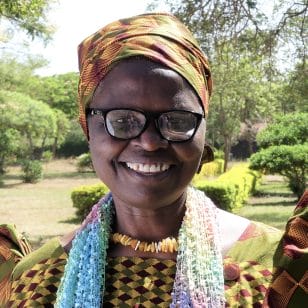In her 66 years, Christine, a Ugandan focolarina, said with her life that there are no insurmountable barriers in the world. She has been able to love each person and every place with great openness: first as an artist with the international group Gen Verde, then in Italy, at the service of the focolarine; and finally, back in Africa, first in Tanzania and then Kenya.  At the beginning of the 1970s Chiara Lubich had an almost daily relationship with the Gen, the young people of the Focolare Movement. In a world in rapid evolution, shaken by revolutions of different ideologies and colours, the founder of the Focolare prepared the gen to conquer the world through evangelical love. A life-long project that, if embraced, required leaving everything behind and knowing how to look far into the future. In 1972 in Masaka, Uganda, Christine Naluyange made her choice. At the age of twenty she left for Fontem (Cameroon) to take part in one of the most visionary experiments in social coexistence of the time: living in a small town, built less than 10 years earlier where people lived together African and European, healthy and sick, gifted or not, so to say to themselves and to the world that fraternity as a way of life is possible, productive and even exportable. Telling about Christine, an African focolarina, a few days after her death on the 21st of July due to an aggressive disease, is not only a duty , but is necessary in times like these, when in the name of sovereign claims walls of all kinds are put up or, of the African continent, one only wants to see the faces of those who flee in search of a future.
At the beginning of the 1970s Chiara Lubich had an almost daily relationship with the Gen, the young people of the Focolare Movement. In a world in rapid evolution, shaken by revolutions of different ideologies and colours, the founder of the Focolare prepared the gen to conquer the world through evangelical love. A life-long project that, if embraced, required leaving everything behind and knowing how to look far into the future. In 1972 in Masaka, Uganda, Christine Naluyange made her choice. At the age of twenty she left for Fontem (Cameroon) to take part in one of the most visionary experiments in social coexistence of the time: living in a small town, built less than 10 years earlier where people lived together African and European, healthy and sick, gifted or not, so to say to themselves and to the world that fraternity as a way of life is possible, productive and even exportable. Telling about Christine, an African focolarina, a few days after her death on the 21st of July due to an aggressive disease, is not only a duty , but is necessary in times like these, when in the name of sovereign claims walls of all kinds are put up or, of the African continent, one only wants to see the faces of those who flee in search of a future.  In her 66 years of life, Christine never considered the many differences encountered as insurmountable walls. On the contrary, she embraced them, she made her own the richness of every person, people and culture: first as an artist, for 23 years part of the international group Gen Verde, then in Italy at the Centre of the Movement, at the service of the women focolarine; then back in Africa, first in Tanzania and then in Kenya. Hers was a varied and full life, where she tried everything. She went on stage, served her brothers and sisters and carried out roles of responsibility; and all was done with great naturalness and normality. Her life was filled with relationships; she approached people with a mother’s heart, more and more ready to listen than to speak, to take care of each one’s needs. It was not for nothing that her motto of life was a phrase from the Gospel that Chiara Lubich had chosen for her: “Go and preach the Kingdom of God” (cf. Mk 16:15). Of the many testimonies that came as a sign of gratitude and praise to God, we report two that express well the human and spiritual richness of Christine. Maricel Prieto, a Spaniard who spent 18 years with Christine in Gen Verde, writes: ” One word, above all, comes to mind when I think of her: ‘royalty’. Christine was royal on stage, but she was also royal when she approached people, when she welcomed someone, when she loaded or unloaded the equipment from our trucks, when she worked in the garden, when she prepared lunch. And this was not just an attitude, but a constant ‘sinking’ into the present moment with a firm adherence to the will of God that made her always available, close”. “Having lived more than half of her life out of the African continent – says Liliane Mugombozi – Chris, as we called her, had acquired in a certain sense a universal ‘culture’, even if – for those who knew her well – she was a Ugandan woman, an authentic daughter of her land. Next to her you felt an enormous openness; she was a ‘world – woman’. Her great faith in and living for unity with a broad vision was impressive, she knew how to go beyond the injustices she had suffered. How can we explain all this? I believe that Chris had made a choice in life: she chose to love and in all her efforts to be consistent, according to the evangelical style of the spirituality of unity her model was Jesus crucified and Forsaken.
In her 66 years of life, Christine never considered the many differences encountered as insurmountable walls. On the contrary, she embraced them, she made her own the richness of every person, people and culture: first as an artist, for 23 years part of the international group Gen Verde, then in Italy at the Centre of the Movement, at the service of the women focolarine; then back in Africa, first in Tanzania and then in Kenya. Hers was a varied and full life, where she tried everything. She went on stage, served her brothers and sisters and carried out roles of responsibility; and all was done with great naturalness and normality. Her life was filled with relationships; she approached people with a mother’s heart, more and more ready to listen than to speak, to take care of each one’s needs. It was not for nothing that her motto of life was a phrase from the Gospel that Chiara Lubich had chosen for her: “Go and preach the Kingdom of God” (cf. Mk 16:15). Of the many testimonies that came as a sign of gratitude and praise to God, we report two that express well the human and spiritual richness of Christine. Maricel Prieto, a Spaniard who spent 18 years with Christine in Gen Verde, writes: ” One word, above all, comes to mind when I think of her: ‘royalty’. Christine was royal on stage, but she was also royal when she approached people, when she welcomed someone, when she loaded or unloaded the equipment from our trucks, when she worked in the garden, when she prepared lunch. And this was not just an attitude, but a constant ‘sinking’ into the present moment with a firm adherence to the will of God that made her always available, close”. “Having lived more than half of her life out of the African continent – says Liliane Mugombozi – Chris, as we called her, had acquired in a certain sense a universal ‘culture’, even if – for those who knew her well – she was a Ugandan woman, an authentic daughter of her land. Next to her you felt an enormous openness; she was a ‘world – woman’. Her great faith in and living for unity with a broad vision was impressive, she knew how to go beyond the injustices she had suffered. How can we explain all this? I believe that Chris had made a choice in life: she chose to love and in all her efforts to be consistent, according to the evangelical style of the spirituality of unity her model was Jesus crucified and Forsaken.
Stefania Tanesini




0 Comments